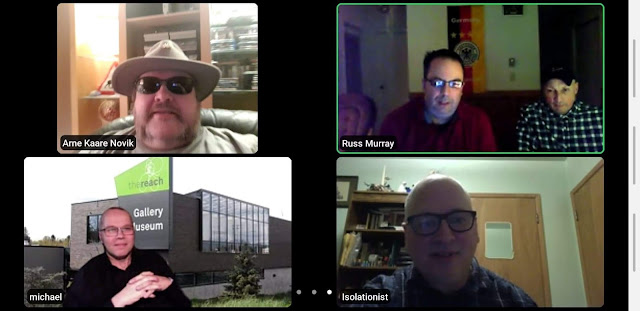Thursday, November 26, 2020
PhD: Twitter quote 34
Tuesday, November 24, 2020
PhD: Twitter quote 33
Monday, November 23, 2020
PhD: Twitter quote 32

Saturday, November 21, 2020
PhD: Twitter quote 31
Friday, November 20, 2020
The Orthodox Study Bible: Cooperation
Thursday, November 19, 2020
PhD: Twitter quote 30

Tuesday, November 17, 2020
PhD: Twitter quote 29
PhD: Twitter quote 29
Twitter version
MPhil: John Calvin (1543)-If freedom is opposed to coercion, I both acknowledge and consistently maintain that choice is free and I hold anyone who thinks otherwise to be a heretic.
MPhil version
Calvin stated concerning free will: If freedom is opposed to coercion, I both acknowledge and consistently maintain that choice is free and I hold anyone who thinks otherwise to be a heretic. If, I say, it were called free in this sense of not being coerced nor forcibly moved by an external impulse, but moving of its own accord, I have no objection. Calvin (1543)(1996: 68).
Human beings in Calvin’s thinking were not forced by God to sin, but God as an infinite being had and used the power to use their sin for the greater good. So to say that God willed evil for the greater good means that God could use sinful actions of others in order to accomplish his divine purpose.
CALVIN, JOHN (1543)(1996) The Bondage and Liberation of the Will, Translated by G.I. Davies, Grand Rapids, Baker Book House.
The MPhil was part one of the PhD program, in a sense.
MPhil Full Version This websiteSunday, November 15, 2020
PhD: Twitter quote 28
Saturday, November 14, 2020
PhD: Twitter quote 27

Thursday, November 12, 2020
The Orthodox Study Bible: Tradition (Brief)
Wednesday, November 11, 2020
PhD: Twitter quote 26

Tuesday, November 10, 2020
PhD: Twitter quote 25
Robert H. Mounce (1995) explains that God directs the affairs in life, for those who love him, for the greater good. Mounce (1995: 187).
Monday, November 09, 2020
PhD: Twitter quote 24
Saturday, November 07, 2020
The necessary is good II
1. The necessary must exist.
2. God is necessary.
3. God's plans are necessary.
4. The contingent exist.
5. The necessary supersedes the contingent.
6. Human beings are contingent.
7. Human being's plans are contingent.
8. Human being's needs are contingent.
Therefore, the suffering of the contingent is permissible.
God by infinite nature, is not obligated or compelled, to create anything finite. God does have significant free will within divine nature. His plans reflect divine nature. I am stating that God's plans must occur and therefore are necessary.
It could be stated that it is a weaker sense of necessity in point 3 than points 1 and 2.
2. God is necessary
Open Edition Journals: Philosophia Scientia What is Absolute Necessity? Bob Hale 16/2/2012
Friday, November 06, 2020
The Orthodox Study Bible: Allegory

Thursday, November 05, 2020
PhD: Twitter quote 23

Wednesday, November 04, 2020
PhD: Twitter quote 22
PhD: Twitter quote 22
University of Wales, Trinity Saint David, Lampeter, Official September 19, 2019PhD version
Donald G. Bloesch (1987) explains that the knowledge of God leading to theological dogmatics should be for the sake of ethical service for God. Bloesch (1987: 12).
Dogmatic theology should not exist for the sake of itself. Bloesch (1987: 12).
Christians should live in service to their neighbours. Bloesch (1987: 12).
BLOESCH, DONALD G. (1987) Freedom for Obedience, San Francisco, Harper and Rowe Publishers.
BLOESCH, DONALD G. (1996) ‘Sin, The Biblical Understanding of Sin’, in Walter A. Elwell (ed.), Evangelical Dictionary of Theology, Grand Rapids, Baker Books.
Tuesday, November 03, 2020
No downtown party for me


Monday, November 02, 2020
PhD: Twitter quote 21
PhD: Twitter quote 21
Photo; Pixabay, Bridge RailwayPhD version
Erlandson explains that many theodicy are fatally flawed since they are too focused on the idea of God creating a world for the best possible state of human beings. Erlandson (1991: 1).
The ideas of Erlandson are in line with sovereignty theodicy, which places greater emphasis on God’s perfect and holy plans in willingly allowing the problem of evil to exist in creation, than does free will theodicy. Erlandson (1991: 1).
ERLANDSON, DOUG (1991) ‘A New Perspective on the Problem of Evil’, in Doug Erlandson PhD Philosophy, Reformed.org, Orange County, Covenant Community Church of Orange County. http://www.reformed.org/
Twitter version
Erlandson explains that many theodicy are fatally flawed since they are too focused on the idea of God creating a world for the best possible state of human beings.
2010 Theodicy and Practical Theology: PhD thesis, the University of Wales, Trinity Saint David, Lampeter
PhD Full Version PDFSunday, November 01, 2020
PhD: Twitter quote 20
 Photo: TimHil , Wales, Pixabay
Photo: TimHil , Wales, Pixabay





















